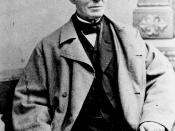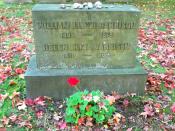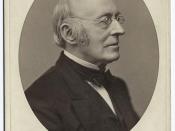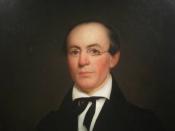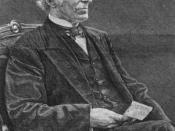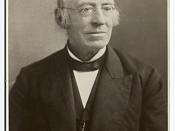William Lloyd Garrison: "The Impact of an Icon" History has been proven to produce remarkable individuals through the use of literature. Their bravery and perseverance are usually matched by none, but envied by all. William Lloyd Garrison is a perfect example of such heroic people. He was determined to relinquish every aspect of slavery and its cruel realities. Garrison, through tactical usage of his literature, knowledge, and keen spirit, created an untouchable persona as a distinguished abolitionist.
The son of a merchant sailing master, William Lloyd Garrison was born in Newburyport, Massachusetts, in 1805. Due in large measure to the Embargo Act, which Congress had passed in 1807, the Garrison family fell on crucial times while William was still young. In 1808 William's father deserted the family, forcing them to scrounge for food from more prosperous families and forcing William to work, selling homemade molasses candy and delivering wood.
His resilience and initiative at such an early age depicted the type of campaign he would run towards the abolition of slavery.
Garrison was seen by many to be a brilliant advocate of the American abolitionist movement, although he did not embody the basic principles of the movement. His publication, "The Liberator," was the start to a pacifist battle against slavery as it eventually came to be regarded as an authoritative influence on radical social reform in general. Garrison insisted that slavery would be abolished only when the mass of white Americans experienced a revolution in their consciences. As a result, he began programs of agitation that aimed to convert public opinion in favor of the emancipation of the slaves, as well as racial equality.
Although his primary focus was the abolition of slavery, Garrison also took a stand in the struggle for women's rights. He contributed in helping Prudence Crandall in her efforts to open a school for young African-American females, as well as aid feminists in creating organizations for women's suffrage. He was greatly commended on his actions, however he was later punished by being dragged through the streets of Boston with a rope around his neck, as a result of his involvement. Incredibly, William Lloyd Garrison survived the attack and continued to fight for his beliefs.
At the tender age of 25, his involvement with the movement became more critical than any other time. He joined organizations such as the American Colonization Society, and collaborated on issues with editor Benjamin Lundy, who would later grant him the position as co-editor of "The Genius of Universal Emancipation". His involvement with Lundy was the very motivation he needed to initiate "The Liberator". Although circulation of his newspaper was relatively limited, with less than 400 subscriptions during the paper's second year, his message of emancipation through non-violent and passive resistance reached an unprecedented number of people throughout the United States.
Garrison's period of incarceration made him even more determined to bring an end to slavery. Although he had previously shared Lundy's belief in gradual emancipation, Garrison now advocated "immediate and complete emancipation of all slaves". He had maintained a virtually non-violent approach on the issue, but was quickly becoming a radical as he publicly burned a copy of the Constitution at an Anti-Slavery rally in Framingham, Massachusetts. People were beginning to label him as a hypocrite as he openly objected to violent measures, but displayed a different side. Garrison's views were particularly unpopular in the South, as the state of Georgia offered $5,000 for his arrest and conviction.
The nature of Mr. Garrison's struggle had been moral and apolitical. In his battle to eradicate the evil of Slavery; he had refused to compromise with any other evil. If he had lacked the political guile to lead a successful campaign, he certainly made amends for it by remaining resolute and unwavering in his stance against slavery. Ultimately, I feel as though William Lloyd Garrison epitomized the very art of abolishing slavery. His determination and hard work paved the way for some of our most prestigious civil rights leaders. Garrison had the rare quality of speaking unequivocally, and remaining unswerving in his struggle against an evil. He often alienated himself from the mainstream of the Abolitionist Movement, however he never compromised the credibility of his work. Garrison, a true prophet to the idea of peaceful battle, taught us to dispense with the use of physical force and to commend our causes with the higher powers of influence, persuasion and truth.
